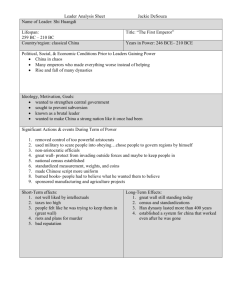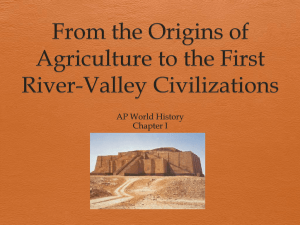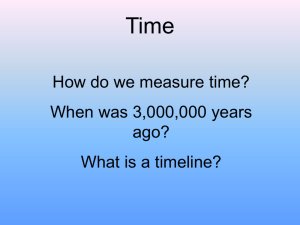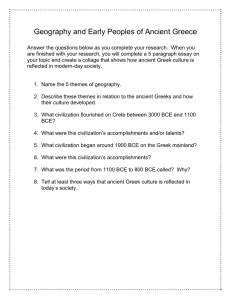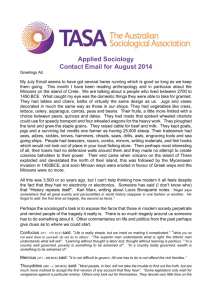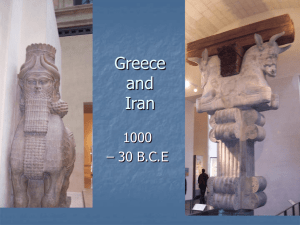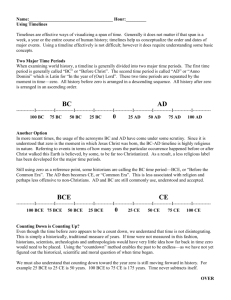投影片 1
advertisement
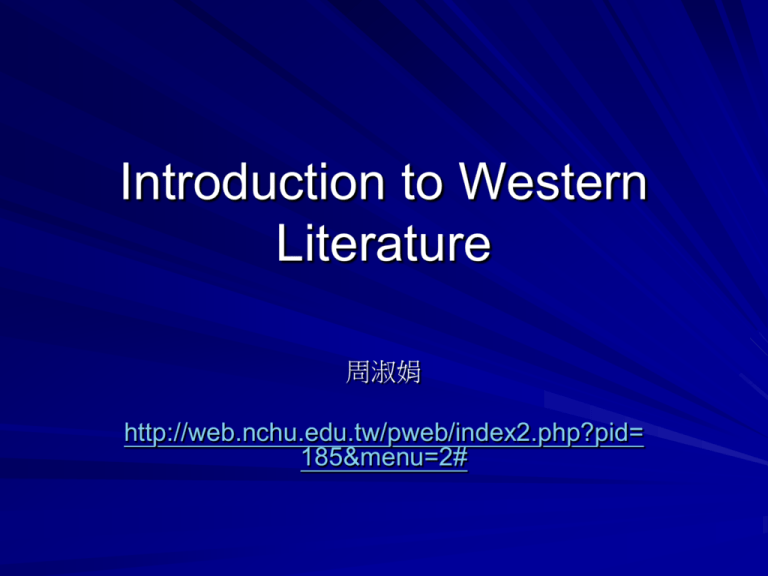
Introduction to Western Literature 周淑娟 http://web.nchu.edu.tw/pweb/index2.php?pid= 185&menu=2# Guiding Questions for a Preliminary Overall Preview What are the two origins of Western civilization? When did modern Israel establish their nation? And where? What is the cause of the political disturbances in the Middle East? Which race does the Israelites belong to? Guiding Questions for a Preliminary Overall Preview What is the religion the Israelites believes in? What is their holy scripture? Have you ever heard of Palestine or the Palestinians? What’s the problem between them and the Israelites? Which race does Christ belong to? Guiding Questions for a Preliminary Overall Preview What is the holy book of Christianity? Who are the people that caused Jesus Christ’s death? And Why? Do you know the relation (the differences) between Judaism & Christianity?) Have you ever heard of Ten Commandments? Or Disney animation Prince of Egypt? Guiding Questions for a Preliminary Overall Preview In what language was the four gospels of New Testament written? What was the official religion of the later Roman empire? What is the British orthodox religion? How did this religion come about? Guiding Questions for a Preliminary Overall Preview Who is the official leader of the Church of England? Guiding Questions for a Preliminary Overall Preview Why did the Puritans migrate to America? Mapping Up the Development of Western Civilization East West South North Structure of the Norton Textbook I. Ancient Mediterranean and Near Eastern Literature (1900 BCE onward) II. Circling the Mediterranean: Europe and the Islamic World (the beginning of CE— 15th century ) III. Europe and the New World: Early Modernity (Renaissance) Our Focus I. The Hebrew Bible (ca. 1000—300 BCE) II. The Greek & Roman World ----Homer (8th century BCE) ----Aeschylus; Sophocles; Euripides (5th century BCE) ----Virgil (1th century BCE) III. The Christian Bible: (the New Testament; 1th century CE) I. Ancient Mediterranean & Near Eastern Literature 1. Near Eastern (Mesopotamia; Egypt; the Hebrews) 2. The Greeks 3. Rome The Invention of Writing Oral literature Written literature First appearance of writing place: Mesopotamia (Tigris & Euphrates rivers) Material: tablets of wet clay 1. 3300 – 2900 BCE (inscriptions with a pointed stick) 2. 2800 BCE: cuneiform (wedge-shaped; 楔 形文字) ---(Sumerian epic Gilgamesh; ca1900—250 BCE) The Fertile Crescent (肥沃月灣) : Euphrates & Tigris Sumerians (3000 BCE) Babylonians (Hammurabi\ˌha-mə-ˈrä-bē\; ca. 17281686 BEC) Assyrians The Deplorable History of the Hebrews tribal period (ca. 2000-1005 BCE) empirical period (1005-925 BCE) the divided kingdom: Israel: 721 BCE Judah: 612 BCE Ruled by various alien races: --Assyrian Empire (746-609 BCE) --Babylonian Empire (609-539 BCE) --Macedonian Empire (336-323 BCE) --Roman Empire (509 BCE--) --Byzantine [bɪˋzæntɪn] Empire (--AD 1453) Egypt (North Africa) Egypt (3000 BCE) Macedonia (Alexander the Great; 326-323 BCE) Ptolemy’s Greek dynasty (till Cleopatra died in 30 BCE; ) The Roman Rule: (the period when the New Testament was written) Other Forms of Writing 1 Place: Egypt Location: temple walls and public monuments Form: hieroglyphic (sacred, carving) (pictographic; 象形文字) Other Forms of Writing 2: The Phoenicians The language that survived, in modified forms, until the present day Adopted by the ancient Hebrews Modified by the Greeks Passed down by Romans Their Cultures 1 Economic dependence on slaves Heavy reliance on natural resources: agriculture and animal husbandry ---valley of the Nile (Thebes & Memphis) ---valleys of the Euphrates and Tigris rivers (Babylon & Nineveh; Fertile Crescent) Their Cultures 2 Time: 2nd millennium BCE onward The Hebrews, the Greeks, the Romans Mediterranean & Near East: A Single Unit Large-scale cultural exchanges Ex. Greek sculpture & architecture (7th BCE) Egypt Striking similarities between Greek and Near Eastern myths Religion Most were polytheistic Gods often reinvented from one place to another (cross-cultural influence) Exceptions: the Egyptian & Hebrew god Religious practice (orthopraxy) more important than religious belief (orthodoxy) Exception: the Hebrew—religion linked to moral code The Greeks Language: Indo-European (印歐語系) First cultural blossom: Minoan (King Minos) Time: 2nd millennium BCE Place: Crete Citadel: Mycenae Palace: Pylos Knowledge of writing The Dark Ages of Greece The Minoan culture destroyed, together with its writing system, by fire in the last century of the millennium 11th—8th century BCE: illiterate The appearance of a new Greek culture 8th century BCE: literate again New language system: borrowed from the Phoenicians Made up of many independent cities: city-states: rivals and fierce competitors land of mountain barriers and scattered islands The Greek Colonization period: 8th & 7th century BCE Location: all over the Mediterranean coast, including the coast of Asia Minor It was in the cities founded on the Asian coast that the Greeks adapted the Phoenician system of writing The Persian invasion of Greece Period: 490—479 BCE Result: the Greeks won under the leadership of Athens and Sparta Effect: the Athenians produced their most important literary and cultural achievement The Film: 300 Sparta vs. Athens Sparta: ---Oligarchy (“rule of the few”) ---strict military discipline ---superior land army controlled majority of the city-states of the Peloponnese Sparta vs. Athens Attica (Athens as its leading city): ---direct democracy (excluding women, slaves & resident aliens) ---women with especially low autonomy than other city-states ---strong fleet power naval alliance Peloponnesian War Conflict: Athens vs. Sparta Period: 431—404 BCE Result: total defeat of Athens Effect: great political and cultural changes Changes in Athens Self-confidence social tensions & anxieties Cultural & intellectual prosperity ---1st anthropological historian: Herodotus ---1st political historian: Thucydides ---the dawning of prose literature ---the great age of Athenian theater: tragedy & comedy Changes in Athens: Education Before: based on the poems of Homer Now: stressing public speaking Sophists (wisdom teachers; 詭辯學家) Subjects: the techniques of rhetoric; government; ethics; literary criticism; astronomy Result: generation gap (“Man is the measure of all things.” A particular Sophist: Socrates (who taught without fee) Investigating ethics, politics, and truth Method: dialectics (question and answer) Belief: the possibility of true goodness His most brilliant student: Plato Historical significance: the starting point for all later Western philosophy The decline of Athens The whole traditional basis of individual conduct, stressing the concern for the unity of the city-state, was undermined. The surrender to Spartan in 404 BCE The execution of Socrates The defeat by Macedon (馬其頓王國)in 338 BCE Macedon and Alexander The great empire that extended into Egypt in the south and to the borders of India in the east Alexander’s death in 323 BCE a number of independent kingdoms rules by his generals (the Hellenistic age) Ptolemy Cleopatra 埃及豔后 (died with the Roman conquest) The Hellenistic Age: A GreekSpeaking World The immigration of the Greeks to the newly conquered territories The great Hellenistic cities grew out of the earlier city-state model and continued many of its civic and political institutions. At Alexandria, in Egypt, a Greek library was formed. The Hellenistic Age: A GreekSpeaking World The Middle-East became a Greekspeaking region The accounts of life and teaching of Jesus of Nazareth were recorded in the simple vernacular Greek know as koine. Rome: History Dominated most of the Italian peninsula by the middle of the 3rd century BCE. Expansion southward brought collision with Carthage, the greatest power in the western Mediterranean. A world power in 201 BCE with its victory over Carthage. Rome: Political System A republic from around 509 BCE Power was shared among Senate (元老院) , the Assemblies (議會) , and Magistrates (政務 官) . The republic would last until 1st BCE. Rome: Culture Seeing conflict as deadly Stressing a sense of tradition which valued seriousness, manly courage, industry, and above all, duty the basis of the Roman power: efficiency and strength through unity a legal code that formed the model for all later European and American law Rome: the talent for practical affairs Sewers Baths with hot and cold water Straight roads Aqueducts to last two thousand years The Middle Ages The rule of the Church vernacular literature besides Latin; Islamic culture the age of faith: religious literature the age of chivalry:knights offering protection against invaders The Story of King Arthur Renaissance (文藝復興) a cultural movement that spanned the period roughly from the 14th to the 17th century, beginning in Italy in the Late Middle Ages and later spreading to the rest of Europe Human beings became again the center of intellectual inquiries. The Beginning of Modernity travel & discovery:Captain John Smith (Pocahontas ) Reformation:--Protestants vs. Roman Catholic Church --Church of England vs. Puritanism Major Writes I. The Classical Period Homer: The Iliad; The Odyssey Aeschylus: the Greek Tragedist (524?-456 BCE) Oresteia A trilogy Agamemnon Sophocles: the Greek Tragedist (ca. 496-406 BCE) Oedipus the King Euripides: the Greek Tragedist (480-406 BCE) Medea A tragedy with feminist thought Plato: the Greek Philosopher (429-347 BCE) Philosophical writing in the form of dialogue Symposium (Drinking Party; 饗宴篇) Virgil: the Roman Poet (70-19 BCE) The Aeneid Epic written by a single author The story about the origin of the Roman empire Augustine: the Roman Theologist II. The Middle Ages Beowulf Epic written in old English Author unknown ca. the 9th century The Song of Roland Epic about chivalry (Charlemagne ) Written in French ca. 1100 AD Dante Alighieri: (1265-1321 AD) The Divine Comedy Written in Italian Boccaccio: (1313-1375) Decameron: written in Italian Sir Gawain & the Green Knight Romance written in middle English Story about King Arthur’s knight Author unknown ca. 1380 AD Sir Thomas Malory: The British Writer (1405-1471) Morte Darthur (Death of Arthur) Religious, chivalric themes Geoffrey Chaucer: The Canterbury Tales 1340-1400 AD Written in middle English Everyman (middle English) Morality play written in middle English Allegory Author unknown ca. 1495 III. Renaissance Francis Petrarch: The Italian Poet (1304-1347 AD) Father of humanism Sonnets Francois Rabelais: (1495-1533 AD) Gargantua and Pantagruel (巨人傳) Written in French the story of two giants amusing, extravagant, and satirical descriptions of humanistic ideals of the time Desiderius Erasmus: 1466?-1536 AD Dutch renaissance humanist The Praise of Folly (Latin) A satirical examination of pious but superstitious abuses of Catholic doctrine Niccolo Machiavelli: The Italian Philosopher (1469-1527 AD) The Prince (君王論) Written in Italian Treatise on the need for stability in a prince’s principality; at stake is its preservation Miguel Cervantes: The Spanish Writer (1547-1616 AD) Don Quixote Written in Spanish A picaresque novel mocking chivalric romance William Shakespeare: The British Writer (1564-1616 AD) Sonnets Plays Hamlet; Romeo & Juliet John Milton: The British Epic Writer (1608-1647) Paradise Lost Question or Suggestion?
